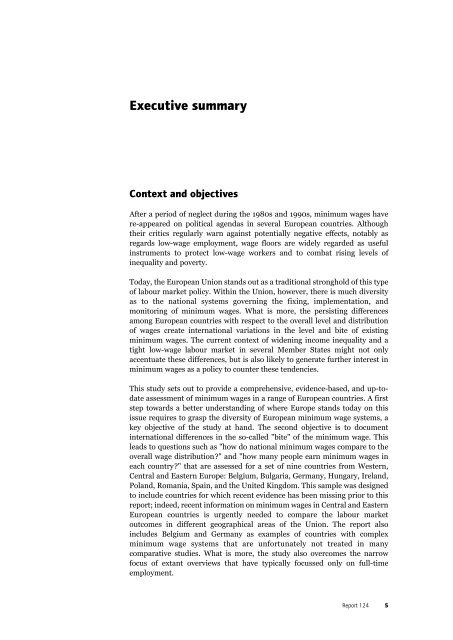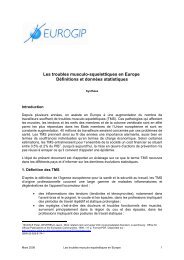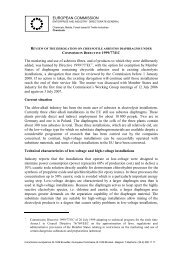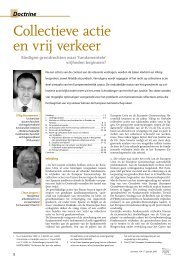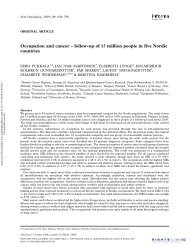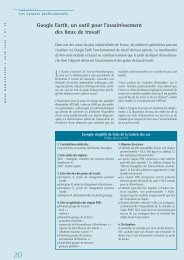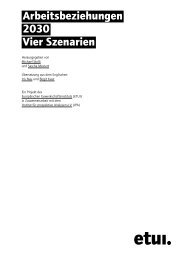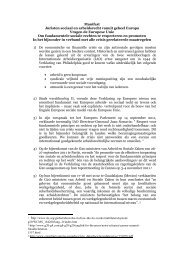Who earns minimum wages in Europe - European Trade Union ...
Who earns minimum wages in Europe - European Trade Union ...
Who earns minimum wages in Europe - European Trade Union ...
You also want an ePaper? Increase the reach of your titles
YUMPU automatically turns print PDFs into web optimized ePapers that Google loves.
Executive summary<br />
Context and objectives<br />
After a period of neglect dur<strong>in</strong>g the 1980s and 1990s, <strong>m<strong>in</strong>imum</strong> <strong>wages</strong> have<br />
re-appeared on political agendas <strong>in</strong> several <strong>Europe</strong>an countries. Although<br />
their critics regularly warn aga<strong>in</strong>st potentially negative effects, notably as<br />
regards low-wage employment, wage floors are widely regarded as useful<br />
<strong>in</strong>struments to protect low-wage workers and to combat ris<strong>in</strong>g levels of<br />
<strong>in</strong>equality and poverty.<br />
Today, the <strong>Europe</strong>an <strong>Union</strong> stands out as a traditional stronghold of this type<br />
of labour market policy. With<strong>in</strong> the <strong>Union</strong>, however, there is much diversity<br />
as to the national systems govern<strong>in</strong>g the fix<strong>in</strong>g, implementation, and<br />
monitor<strong>in</strong>g of <strong>m<strong>in</strong>imum</strong> <strong>wages</strong>. What is more, the persist<strong>in</strong>g differences<br />
among <strong>Europe</strong>an countries with respect to the overall level and distribution<br />
of <strong>wages</strong> create <strong>in</strong>ternational variations <strong>in</strong> the level and bite of exist<strong>in</strong>g<br />
<strong>m<strong>in</strong>imum</strong> <strong>wages</strong>. The current context of widen<strong>in</strong>g <strong>in</strong>come <strong>in</strong>equality and a<br />
tight low-wage labour market <strong>in</strong> several Member States might not only<br />
accentuate these differences, but is also likely to generate further <strong>in</strong>terest <strong>in</strong><br />
<strong>m<strong>in</strong>imum</strong> <strong>wages</strong> as a policy to counter these tendencies.<br />
This study sets out to provide a comprehensive, evidence-based, and up-todate<br />
assessment of <strong>m<strong>in</strong>imum</strong> <strong>wages</strong> <strong>in</strong> a range of <strong>Europe</strong>an countries. A first<br />
step towards a better understand<strong>in</strong>g of where <strong>Europe</strong> stands today on this<br />
issue requires to grasp the diversity of <strong>Europe</strong>an <strong>m<strong>in</strong>imum</strong> wage systems, a<br />
key objective of the study at hand. The second objective is to document<br />
<strong>in</strong>ternational differences <strong>in</strong> the so-called "bite" of the <strong>m<strong>in</strong>imum</strong> wage. This<br />
leads to questions such as "how do national <strong>m<strong>in</strong>imum</strong> <strong>wages</strong> compare to the<br />
overall wage distribution?" and "how many people earn <strong>m<strong>in</strong>imum</strong> <strong>wages</strong> <strong>in</strong><br />
each country?" that are assessed for a set of n<strong>in</strong>e countries from Western,<br />
Central and Eastern <strong>Europe</strong>: Belgium, Bulgaria, Germany, Hungary, Ireland,<br />
Poland, Romania, Spa<strong>in</strong>, and the United K<strong>in</strong>gdom. This sample was designed<br />
to <strong>in</strong>clude countries for which recent evidence has been miss<strong>in</strong>g prior to this<br />
report; <strong>in</strong>deed, recent <strong>in</strong>formation on <strong>m<strong>in</strong>imum</strong> <strong>wages</strong> <strong>in</strong> Central and Eastern<br />
<strong>Europe</strong>an countries is urgently needed to compare the labour market<br />
outcomes <strong>in</strong> different geographical areas of the <strong>Union</strong>. The report also<br />
<strong>in</strong>cludes Belgium and Germany as examples of countries with complex<br />
<strong>m<strong>in</strong>imum</strong> wage systems that are unfortunately not treated <strong>in</strong> many<br />
comparative studies. What is more, the study also overcomes the narrow<br />
focus of extant overviews that have typically focussed only on full-time<br />
employment.<br />
Report 124<br />
5


